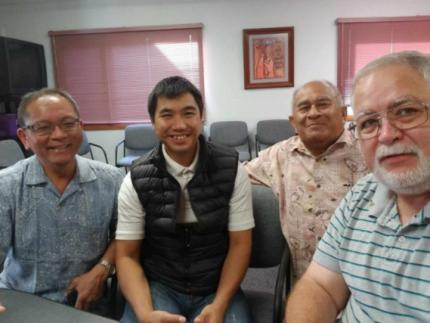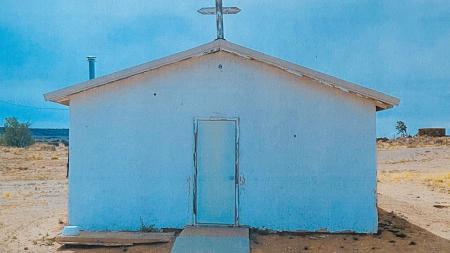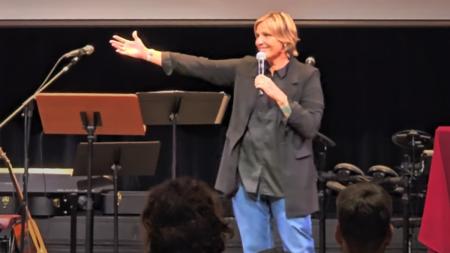Leaders Visit Immigrant Congregations

(left to right) Fernando del Rosario, Mal Sawm Thanga, Fatu Auau, and RCA elder Randy Karcher met to talk about Chin Christian Reformed Church in North Syracuse, N.Y.
Fatu Auau, SEAPI
Fernando del Rosario led the Council of Delegates of the Christian Reformed Church in North America in a time of prayer on Friday, Oct. 11. The delegate from Central California is also a commissioned pastor with Christ’s Community Church in Hayward, Calif. He encouraged delegates to specifically be in prayer for immigrant churches within the Christian Reformed denomination.
“About 40 years ago the first refugees came,” del Rosario said, referring specifically to refugees from Southeast Asia who came to North America fleeing war and persecution. “They came here not to be persecuted again but to enjoy freedom and life, to enjoy their new faith in Jesus Christ. For many, the last 40 years have been a struggle. With God’s grace and power we will make the next 40 years better.”
Del Rosario, himself an immigrant from the Philippines, is deeply connected to many of these immigrant Christians through a group of CRCs known as SEAPI (Southeast Asian and Pacific Islander).
SEAPI was founded in 2007 as a self-functioning peer learning group — funded through Pastor Church Resources and what is now Resonate Global Mission. Itis one of six voluntary, ethnic minority associations within the CRCNA whose leadership works with the denomination for the benefit of churches and leaders. The other groups include Black and Reformed, Consejo Latino (Hispanic), East Meets West (Chinese), Korean, and Native American/First Nations.
When SEAPI first started, approximately 20 churches, each with a history and connection to immigrants from Southeast Asia and Pacific Island countries, agreed to gather at least once a year for a time of ministry updates, fellowship, encouragement, and training.
A look at the current leadership of SEAPI helps to provide a glimpse into the diversity of this group. President Fatu Auau is a commissioned pastor of a Samoan church, Emanuelu Church in Fountain Valley, Calif. The vice president, Julius Umawing, is a minister of the Word at a multicultural congregation, Bethel CRC, in Sun Valley, Calif., which worships in English and Spanish.
Matthew Ming Le, SEAPI treasurer, was a refugee from Vietnam and currently pastors Little Saigon CRC in Westminster, Calif. John Kim, SEAPI secretary, was a refugee from Cambodia and today pastors the Khmer CRC in Aurora, Colo.
Two advisers also serve the group: Jonas Muljo, who led two Indonesian congregations in the Los Angeles area, and Socheth Na, a former refugee who pastors the Cambodian Fellowship CRC in Holland, Mich.
As for del Rosario, from 1995-2008 he led a Filipino church in Hayward. He appreciated the support he gained by connecting with other immigrant churches, even if they represented cultures different from his Filipino background.
“As SEAPI, though we are composed of 10 different ethnic groups, we share a simple goal despite our cultural differences,” del Rosario explained. “We believe we are called by God to help and support each other (pastors, their spouses, church leaders, and congregations) to grow from being ‘survival-mode’ first-generation immigrant churches into thriving intergenerational, and potentially intercultural CRCs.”
Today del Rosario serves as coordinator for two SEAPI projects: online community (website and Facebook Group) and more recently, church visiting.
In a proposal submitted to the CRCNA, the SEAPI leadership explained that while SEAPI used to be more tightly connected, relationships have waned in recent years. Many of the original founding pastors are retiring or nearing retirement, and many congregations are still struggling with uncertain visions and means for their future.
In addition, congregations are wrestling with their identity as second and third generation members mature and have different ideas about the congregation’s future than their first-generation immigrant parents had.
Fatu Auau and other SEAPI leaders have seen churches struggle and even close as a result of these changes. Sometimes these closures have happened without SEAPI or the CRCNA knowing there had been problems.
“If we knew what they had been going through, some of us could have helped even in small ways,” said Auau. “Bottomline: we do not want to hear anymore of any SEAPI church dying or even just coasting along mainly because nobody is helping them.”
With this in mind, the SEAPI leadership proposed that they conduct church visits with all 26 SEAPI congregations within the CRC over a six-month period. This proposal was approved and funded by the CRCNA’s Ethnic Diversity Functional Team and Resonate Global Mission.
In teams of two or three visitors, del Rosario, Auau, Na, and Le have been listening to the stories of immigrant churches, hearing about their ministries, and finding greater opportunities to connect them to the SEAPI group as well as to their parent churches, local classes, and other CRC ministries for support and encouragement.
The church visits began in May and will wrap up in November 2019. You can see some photos from these visits in this Facebook album.
As del Rosario prepared to lead in prayer for the Council of Delegates, he shared the story of one of the congregations he and Auau had visited — Chin Christian Reformed Church in North Syracuse, N.Y. This is one of three Chin CRCs in the CRCNA.
“For more than 10 years now, a group of Chin refugees has been gathering in this quiet residential neighborhood in North Syracuse,” he said.
This Chin church has been working to bring in a pastor from Myanmar, but his immigration paperwork hasn’t come through yet. Despite this setback, the congregants continue to worship and do as much as they can to minister to one another without a pastor.
Del Rosario shared that while he and Auau weren’t able to worship with the congregation, they did meet with two church leaders.
“We listened to their faith journey, hopes, and dreams over a cup of coffee. . . . They are Mal Sawm Thanga and Lal Ram Lawm. God continues to bless them and the other leaders in their church,” said del Rosario. “We also received a warm welcome and hospitality by Elder Randy Karcher of the Pitcher Hill Community RCA. This RCA graciously houses the Chin church in their building.”
In fact, Karcher shared with the SEAPI visitors that on most Sundays the cars for the Chin church outnumber the RCA cars in the parking lot.
“I bring this to you to say that whenever people gather for Jesus Christ, it is something to be thankful for. For me, as a Christian and as a pastor, it humbles me because they are trying to be a church even without a pastor, based on what they have learned from the Bible,” said del Rosario.
Upon completion of the church visits, the SEAPI group intends to provide a summary report to each participating congregation as well as to their calling council and classis and the Ethnic Diversity Functional Team. SEAPI will respond in modest ways to the expressed needs and will also connect congregations with additional resources available in the CRCNA.
From these church visits, SEAPI will be able to identify common needs and problems, as well as potential and best-ministry practices from this multiethnic church group, said del Rosario. SEAPI leaders are therefore praying for God to bless and lead their work — laying a good foundation today for the next 40 years of healthier, thriving, multigenerational, and multicultural churches that bring glory to God.
After sharing this story, del Rosario asked the COD members to pray in small groups for the immigrant churches in their regions, the work of the COD, and their classes. The time of prayer then concluded with a prayer spoken in Tagalog — del Rosario’s native language of the Philippines.


